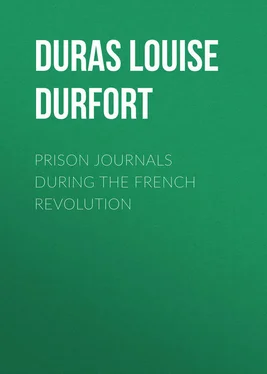Louise Duras - Prison Journals During the French Revolution
Здесь есть возможность читать онлайн «Louise Duras - Prison Journals During the French Revolution» — ознакомительный отрывок электронной книги совершенно бесплатно, а после прочтения отрывка купить полную версию. В некоторых случаях можно слушать аудио, скачать через торрент в формате fb2 и присутствует краткое содержание. Жанр: foreign_antique, foreign_prose, на английском языке. Описание произведения, (предисловие) а так же отзывы посетителей доступны на портале библиотеки ЛибКат.
- Название:Prison Journals During the French Revolution
- Автор:
- Жанр:
- Год:неизвестен
- ISBN:нет данных
- Рейтинг книги:5 / 5. Голосов: 1
-
Избранное:Добавить в избранное
- Отзывы:
-
Ваша оценка:
- 100
- 1
- 2
- 3
- 4
- 5
Prison Journals During the French Revolution: краткое содержание, описание и аннотация
Предлагаем к чтению аннотацию, описание, краткое содержание или предисловие (зависит от того, что написал сам автор книги «Prison Journals During the French Revolution»). Если вы не нашли необходимую информацию о книге — напишите в комментариях, мы постараемся отыскать её.
Prison Journals During the French Revolution — читать онлайн ознакомительный отрывок
Ниже представлен текст книги, разбитый по страницам. Система сохранения места последней прочитанной страницы, позволяет с удобством читать онлайн бесплатно книгу «Prison Journals During the French Revolution», без необходимости каждый раз заново искать на чём Вы остановились. Поставьте закладку, и сможете в любой момент перейти на страницу, на которой закончили чтение.
Интервал:
Закладка:
duchesse de Duras
Prison Journals During the French Revolution
PRISON LIFE DURING THE FRENCH REVOLUTION
The period of my confinement in different prisons during the Reign of Terror was so harassing that the idea of writing out its details did not then occur to me; but when I had the consolation of seeing my son once more, he was desirous of learning all about it. I feared that I should be overcome by my feelings if I tried to relate the details to him, and consequently determined to write the following memoirs.
My parents retired to their estate of Mouchy-le-Châtel, in the Department of the Oise, in the month of September, 1792. I accompanied them thither, and was their sole companion. They resolved, from prudential motives, to receive visits from no one. This privation cost my father nothing, for he was naturally shy, though the positions he had occupied had forced him to live constantly in the great world. My mother, who loved him dearly, accustomed herself to retirement with submission to the will of Providence, with the naturally happy disposition maintained through all the events of her life.
She loved system in all things, and she introduced it so successfully into our daily life that it passed rapidly. Reading, work, play, and walking filled up every moment. My parents took pleasure in furnishing refreshment to the harvesters during their weary labour, in sympathizing with their troubles, and in helping them by kindnesses. In spite of the position in which the Revolution placed my father, and the natural repugnance which he declared he felt for those who were engaged in it, he gave volunteers the means of paying their way. My father had, if I may so express myself, a passion for charity. His hands were always ready to bestow, and whenever he received a sum of money he would in a few hours declare, with satisfaction, that he had none of it left.
He could keep nothing when he knew that others were suffering; hospital visiting, aid rendered in private, all sorts of kind deeds and comforting words, – in fact all good works were familiar to him; in these alone he found happiness.
I have seen him refuse things which he might have considered necessary for himself in order to add to the number of his charities. Yet my father was born with a very unhappy disposition; the fortune, the honours, and all the pleasures that his position secured him were spoiled by the most miserable discontent. I frequently endeavoured, firmly and respectfully, to show him that Heaven had bestowed every gift upon him, and that nothing was wanting to his position. He listened patiently to what I had to say; but I did not succeed in convincing him. I worried myself and gained nothing. My mother, on the contrary, often said to me that if she should return to society she would not desire to change her manner of living in the least. She had a charmingly happy disposition, and was never out of humour for a moment.
Several times during the Revolution it was proposed that I should emigrate. One of my relatives sent for me at different periods, and urged me to consent to do so. I always refused, having a great repugnance to leaving my country, and desiring to watch over the old age of my parents, who were already separated from some of their children.
How great would have been my regret had I not remained with them up to the moment when I was deprived of my liberty. I shall retain to my latest breath the memory of their kindness, and the tenderest gratitude for the good example and daily lessons in virtue which I received from them.
But to return to the details of our family life at Mouchy. Every day I was filled with wonder to see my father, who from his youth had been accustomed to command (he had at the age of seven been given the reversion of the governorship of Versailles, after his father's death), obey without complaint the Revolutionary laws and all those who executed them. Everything worried him under the old régime, yet during the Reign of Terror he was calm because he was entirely resigned to the will of God. Religion had regulated all the actions of his life. It was really, for him, eternal happiness.
We suffered great anxiety during our sojourn at Mouchy. We were utterly ignorant of the fate of my elder brother. 1 1 The Prince de Poix, who had defended and followed the king on the 10th of August.
A price had been put on his head and the notice of it posted at the corners of the streets of Paris, and the newspapers had stated that he had been guillotined. One afternoon, in the month of October (the 10th), we saw approaching us quite a large body of troops composed of Hussars and National Guards from different villages of the estate of Mouchy. It was preceded by a commissioner of the Committee of General Security, named Landry, who came to arrest my brother, believing that he was concealed in the castle. We were surprised, but not frightened. It was absurd to suppose that he would have chosen his own father's house for his hiding-place. They searched everywhere under pretext of taking him and of seizing arms, but they found nothing.
The official report made by the commissioner and the municipality proves this.
The drawing up of the report and the search lasted from five o'clock in the evening to eleven. Landry, called upon my father to denounce his son, though he could not even know whether he was alive or not. He answered with much dignity that such a demand was as harsh as it was unusual, and that he would not accede to it; yet he asked Landry, to take something to eat, and lent him one of his saddle horses to take him back to his carriage. My father, who was naturally very fiery, knew how to control himself when the importance of the occasion required it.
The officer of the Hussars who commanded the detachment was a very excellent man. He told us that he was marching with his troop along the highway from Beauvais, to Paris; that being required by the commissioner of the Committee of General Security to accompany him to Mouchy, he had been obliged to obey him, though with great repugnance, and that he came with the kindest intentions possible. He gave me an immediate proof of this; for he whispered in my ear that if my brother was in the house he would advise me to hasten his escape, and that he would be very glad of it. I have retained a feeling of real gratitude for this officer, whose name I do not know; he was from the region of Rouen.
The intense animosity which was shown in the attempt to capture my brother increased our anxiety concerning our own fate. A report, circulated by the newspapers, that he was in England somewhat allayed our anxiety; and Monsieur Noël (my father's man of business, who has given proof of the strongest attachment to our family) afterward assured us of its truth. When he entered the drawing-room we were much agitated, not knowing what news he was about to announce to us.
Various accounts have been given of the manner in which my brother escaped the scaffold. Some have said that he escaped from prison by the payment of a hundred thousand crowns to Manuel, then Procureur, of the Commune; others, that he left Paris disguised as a wagoner, and had been seen passing along several roads.
The truth is that he was never arrested, and that he found good and brave men who were kind enough to hide him in their houses; that he remained for several hours in the very top of the Louvre, stretched upon a beam, at the very moment when the famous search of September, 1792, was made; and that afterward he escaped by means of a passport to Granville, where Monsieur Mauduit, his son's old tutor, a naval commissioner, assisted him to embark for Dover.
Monsieur Mauduit, was guillotined, but he made no mention of my brother's affairs at his trial. My poor brother, having sailed from port, thought he had escaped death. A storm compelled his vessel to return to the port. He was obliged to hide himself in a place so close that his suffering for want of air came near causing him to betray himself. The search ended just in time to save his life, and he again set sail. It is also false that he used large sums of money to get out of his danger. He was not forced to spend more than two thousand crowns. The knowledge that he was out of danger diminished our daily increasing anxiety.
Читать дальшеИнтервал:
Закладка:
Похожие книги на «Prison Journals During the French Revolution»
Представляем Вашему вниманию похожие книги на «Prison Journals During the French Revolution» списком для выбора. Мы отобрали схожую по названию и смыслу литературу в надежде предоставить читателям больше вариантов отыскать новые, интересные, ещё непрочитанные произведения.
Обсуждение, отзывы о книге «Prison Journals During the French Revolution» и просто собственные мнения читателей. Оставьте ваши комментарии, напишите, что Вы думаете о произведении, его смысле или главных героях. Укажите что конкретно понравилось, а что нет, и почему Вы так считаете.












